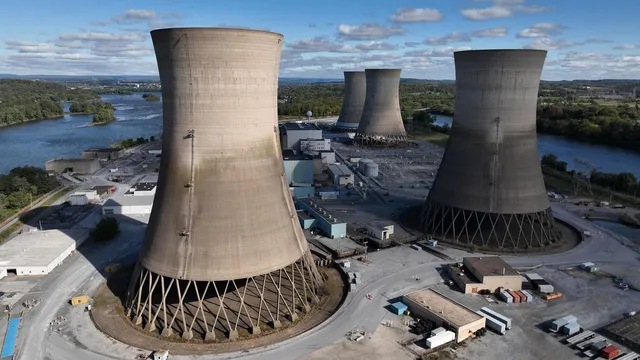
Meta partners to secure nuclear energy for AI needs
2025-06-03 16:58- Meta has signed a long-term agreement with Constellation Energy to revive a nuclear power plant for future AI operations.
- The tech industry's energy supply currently relies heavily on fossil fuels, with nuclear and renewable sources making up a small fraction.
- In the long run, transitioning to nuclear energy will be crucial for meeting the growing energy demands of AI products sustainably.
Express your sentiment!
Insights
In the context of the rising energy demands of artificial intelligence, Meta has entered into a 20-year agreement with Constellation Energy as part of its strategy to enhance its energy supply. This agreement involves the revitalization of a nuclear power plant in Illinois, signaling a shift towards more sustainable energy solutions in the tech industry. Several major tech companies, including Amazon, Google, and Microsoft, have started similar initiatives, recognizing the pressing need for reliable and cleaner energy sources. Despite these efforts, it is anticipated that it may take years for nuclear energy to adequately address the industry's increasing electricity needs, particularly as the demand continues to surge due to generative AI products. A report from the International Energy Agency highlights that the overwhelming majority of electricity consumed by U.S. data centers is derived from fossil fuels, predominantly natural gas and occasionally coal, which contributes significantly to climate change. Although the integration of renewable energy—particularly solar and wind—has increased, it currently accounts for only about 24% of data center power usage in the U.S., with nuclear energy contributing a mere 15%. This gap signifies the ongoing reliance on fossil fuel power generation as AI demand grows. Meta, while welcoming nuclear energy advantages, is relying more heavily on natural gas as an immediate solution for its growing data center needs. The company aims to prepare for a considerable expansion of its operations, particularly with the construction of a new data center complex in Louisiana, which is expected to heavily depend on natural gas-fired power plants. Meanwhile, the potential for nuclear power remains notable, particularly as nations like France assert their leadership in AI by leveraging their extensive nuclear infrastructure. As environmental concerns escalate, and the energy consumption of data centers—and by extension, AI—continues to rise, addressing the balance between fossil fuels and cleaner energy sources like nuclear power will be vital for sustainable technology growth. It is clear that as more companies strive for greener alternatives, the hours and costs associated with transitioning to nuclear energy will play a crucial role in shaping the future of AI operations.
Contexts
The future of renewable energy sources in tech industries is set to reshape the landscape of production, innovation, and sustainability. As we progress through the 2020s, there is an increasing realization of the vital role that renewable energy plays in mitigating climate change and enabling a sustainable future. Tech industries are at the forefront of adopting renewable energy solutions, ranging from solar and wind power to innovative energy storage systems. These sources not only provide a cleaner way to power operations but also reduce costs over time due to the decreasing prices of technology associated with renewables. Industry leaders are aligning their business strategies with sustainable practices, understanding that investment in green energy is not only a moral imperative but also a competitive differentiator that can enhance brand reputation and customer loyalty. The integration of renewable energy in tech industries is supported by advancements in technology. Energy-efficient hardware and software solutions are evolving rapidly, and companies are investing in smart technologies that optimize energy consumption. For instance, tech firms are increasingly implementing artificial intelligence and machine learning to forecast energy demand, optimize energy use, and reduce waste. Moreover, the development of microgrids and decentralized energy systems enables companies to generate, store, and manage their own renewable energy, thereby enhancing resilience and reducing dependency on conventional power sources. This transition toward self-sufficiency is not only favorable from an operational standpoint but also advantageous during power outages or surges in energy costs. Government policies and incentives also play a crucial role in accelerating the adoption of renewable energy in the tech sectors. Many governments around the world are implementing stringent regulations to reduce greenhouse gas emissions, along with providing financial incentives for businesses to switch to renewable energy. Tax breaks, grants, and favorable tariffs create an enabling environment for tech companies to invest in sustainable energy solutions. As corporate social responsibility becomes a significant factor in brand management, firms are motivated to champion sustainability initiatives that resonate with a growing segment of environmentally conscious consumers. This trend is expected to continue as awareness of climate issues increases among the public and shareholders alike. Looking to the future, the direct implications of renewable energy adoption in the tech industries include job creation, innovations in energy technologies, and the enhancement of corporate sustainability profiles. Companies that prioritize renewable energy will likely see improved operational efficiency and reduced costs while contributing to broader efforts to combat climate change. As renewable energy technologies continue to develop, their integration into the tech sector will enable significant leaps toward a greener economy. Ultimately, the commitment to renewable energy sources will not only redefine the operational strategies of tech industries but also pave the way for a more sustainable and resilient society.